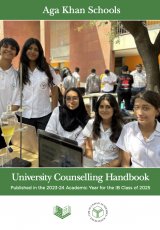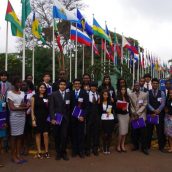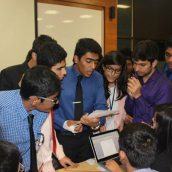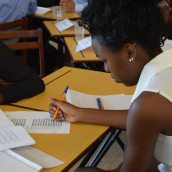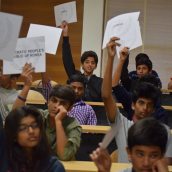What Students Say About MUN
“When I heard about it, I thought it was something for those ‘well off’ who could speak very eloquently and debate very well. I thought I’d never make it there….Currently, MUN has more or less become like a part of me, a part of me that I always seek to work on and ensure that it is functioning properly – another limb for which I have passion and drive.”
Amsal Lakhani is a recent graduate of AKA, Mombasa. He joined the Academy’s Model UN Club in grade 8. Whilst there he attended 11 conferences, five as a delegate, five as a chair and one more learning-based session in Geneva.
“I just wanted a forum in school – a place to debate….It’s hard for us as students to get involved with these very complex issues at a high school age. And it was tough for me, and I liked the challenge….It has really given me the way to think – it was always like two perspectives on everything. So that’s really given me a way to think about things as I come into college.”
Rishi Jain is a DP2 (final year) student at the Aga Khan Academy, Hyderabad. He’s been doing Model UN for two years and since then has attended nine conferences. Most recently he served as the Under-Secretary-General for committees at the recent AKA, Hyderabad Model UN conference (AKA,H MUN).“At first I had no idea what was going on, but as the second day came I actually understood how MUN works, and I realised that all you need here is good research and the way you speak and how confident you are….Amazing experience. Debating skills. Confidence. Leadership skills.”
What Was Their Best Debating Experience?
“The hardest topic I have ever had to debate was what we call a crisis resolution, an impromptu resolution, where the Dalai Lama was kidnapped by a Chinese fighter. They requested sanctions removed on Iran – all of them – and they had world leaders in sight and would kill them if their demands were not met – within the next 12 hours. The resolutions proved almost impossible to solve because of the time restriction and the fact that the United Nations does not negotiate with terrorists.” – Bevertone
“The albedo effect. Me and a friend of mine, we got together and made this resolution that we found really interesting. If we could pump some gases into the atmosphere above the North and South Poles that would reflect the sun’s rays back out instead of melting the ice even more, that could be a temporary solution for rising sea levels and some of the effects of global warming. So funnily enough, when we took that resolution to Nairobi – because it did get quite technical throughout – a lot of people didn’t like it at all. It was shot down very, very quickly, but we had a good time writing it.” – Amsal
“The Crisis Committee experiences, because we had to be on our feet, think constantly. We would sit back and discuss like it was the real world, and we felt like we were dealing with real-world issues….Beyond all the research, beyond all the information that you gather, the whole idea of a Model UN is to test how well you can think on your feet, how well you can think on the spot – and a crisis situation actually does that, especially when you’re woken up from your sleep and just told to run to committee in your pyjamas.” – Alisha Sonawalla (AKA, Hyderabad graduate and recently the Secretary-General of the AKA,H MUN).
How MUN Has Impacted Their Academic and Non-Academic Life
“You require leadership skills, and you require debate skills. If you don’t have that, you eventually develop that at the MUNs because you see people speaking, and when people target you, you actually have to get up and speak and defend your nation, or else you will be thrown out of the committee. Literally thrown out. It forces you to speak up. And this helps you in the future.” – Rishi
“One of the major things that extrapolated across humanities and Model UN was the Israel–Palestine issue. Now I couldn’t tell you exactly how I used the Model UN framework for that, but it definitely gave me a way to understand it and think about it, and I applied that in my humanities classes in the kinds of essays I wrote….It’s like a completely different way of approaching things, which doesn’t really happen in class. It’s less academic. You have to drive yourself to find more and learn more and debate.” – Amsal
The effect is massive…there are a lot of skills that go into Model UN. For example, lobbying. How do you present yourself? How do you convey your ideas diplomatically in an inoffensive way? How do you put your argument forth? How do you think logically? How do you think on your feet? All these skills were helpful in class discussions or debate in school – or even in general situations….It introduced me to a lot of issues because Model UN isn’t just about going to a conference all suited up and just debating issues and getting that award, it’s about thinking about real-world issues that are being faced by the UN – being faced with issues that are currently being faced in the world. And that’s the time I realised I wanted to do something about it rather than just debate about it.” – Alisha
Compiled by Farah Mohamed
Return to the AKA newsletter (browser version)
publications
